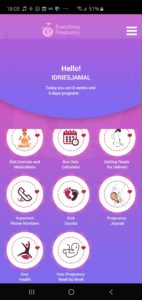My brother and I wrote Everything You Ever Wanted to Know About Pregnancy because we wanted to compile all the questions (and answers) that our pregnant patients and their families have asked us over the last 15+ years. Two years, over 400 pages written, and a pregnancy tracker app later, and we had the book and app that will be this generation’s What to Expect When You Are Expecting. We will have weekly blogs based on sections from the book, so be sure to come back every week and check them out!
Most pregnant women (about 75%) will experience some degree of “morning sickness.” For many, this nausea may last throughout the day and night. So, why do pregnant women often experience nausea and vomiting, and what can you do to make it better?
Is this real, or am I imagining this: Approximately 3 out of every 4 pregnant women will experience morning sickness at some time during their pregnancy, so no, you are not imagining this!
Why is it happening?
Morning sickness is one of the first symptoms of pregnancy and, it has many causes, including:
- Hormonal fluctuations. The hormones hCG, estrogen, and progesterone can all trigger nausea and vomiting.
- An increased sense of smell.
- Vitamin B deficiency.
- Low blood pressure.
Tell me more? Morning sickness is definitely a misnomer since it can occur at any time of day, and for many women, it occurs 24-hours a day. Be sure to get a good pregnancy calculator like the Everything Pregnancy app to determine exactly how far along you are. Morning Sickness is most prevalent during the first trimester, peaking at about 10 weeks of pregnancy. A good pregnancy app can help you track your pregnancy week by week, but just be aware that nausea and vomiting can persist beyond the 10thweeks and in some, it even persists throughout the pregnancy.
Can I treat this? While few things will completely eradicate the morning sickness, there are things that you can do to reduce the symptoms:
- Eat smaller meals more frequently: Eat enough to take away the sensation of hunger without producing the feeling of a full stomach. This means eating 5-6 smaller meals throughout the day. Be sure to check out the Everything Pregnancy app to learn more about a healthy pregnancy diet.
- Try blander, less spicy foods: During pregnancy, spicy or overly flavorful foods are not your friend. Generally, blander foods tend to cause less nausea and vomiting.
- Avoid deep-fried foods: During pregnancy, the GI tract is already moving slower than usual, and deep-fried foods only exacerbate this problem.
- Avoid citrus, spicy, and/or foods with a tomato-base: All of these worsen heartburn and reflux, which can, in turn, exacerbate nausea and vomiting.
- Try ginger and peppermint: Ginger and peppermint in most forms (candy, tea, etc.) are common remedies for reducing nausea and vomiting of pregnancy.
- Add vitamin B complex: Supplementing with vitamin B6 and vitamin B12 has been found to reduce nausea and vomiting of pregnancy. Vitamin B6 doses range from 10 to 25mg up to three times daily, and Vitamin B12 doses range from 4 mcg to 25 mcg daily.
- Consider anti-emetics (anti-nausea medications): Numerous anti-nausea medications are safe and effective for use during pregnancy. Medications like Reglan are designed for general nausea while medications like Diclegis, are specifically designed for use during pregnancy.
- Acupuncture and acupressure: For many women, acupuncture and acupressure provide relief from pregnancy-induced nausea and vomiting. Acupressure can be applied three fingerbreadths below the wrist over the large tendons that run in this area. Applying mild to moderate pressure while making circles for 2-3 minutes may help to relieve nausea.
- Start your day slowly: For many women, nausea and vomiting of pregnancy is exacerbated by motion (much like motion sickness). Setting your alarm clock 5-10 minutes early, and starting your day off slowly can reduce morning sickness.
- Maintain hydration: Dehydration worsens nausea and vomiting. Preventing nausea is just one of the many reasons that hydration during pregnancy is important. Pregnant women should drink 72-80 ounces of water daily; the more, the better.
- Cold food: Colder foods tend to produce less nausea and vomiting than warmer foods.
- Brush your teeth after meals: Brushing your teeth, especially with mint toothpaste, can reduce nausea and vomiting. A lot of cases of nausea are related to dysgeusia (a persistent bad taste in the mouth), a common condition during pregnancy.
- Get some fresh air: Closing one’s eyes, clearing the mind, and taking some deep breaths (especially of fresh air if you can get out) frequently reduces nausea and vomiting of pregnancy.
Will this get better?
For most women, morning sickness peaks at about 10 weeks, and by the end of the first trimester, it almost completely resolves. For those unlucky souls who have nausea and vomiting beyond the first trimester, it does tend to at least improve as you get into the second trimester, and it will resolve soon after delivery.
When should I call my provider? While nausea and vomiting of pregnancy are very normal, there are times when it can be dangerous. You should contact your provider ASAP if:
- You are unable to keep solids or liquids down for more than 24 hours.
- You experience signs of dehydration such as decreased urination, dark or concentrated urine, dry mouth, dry or cracked lips, dry skin, dizziness, fatigue, or loss of consciousness.
- You are vomiting blood.
- Persistent headaches accompany your nausea.
- You have a rapid heartbeat.
These are just our recommendations and they do not constitute medical advice. Be sure to speak with your doctor or midwife before making any medical decisions.
If you want more where this came from, the book is available in both print and digital formats from Amazon RIGHT HERE!
You can also get the free Everything Pregnancy app in the Google Play Store RIGHT HERE
and the Apple iTunes store RIGHT HERE.
If you have any pregnancy-related questions, submit them on our website www.Everything-Pregnancy.com
Follow us on social media:
- Facebook: TwinDoctorsTV
- Twitter: @TwinDoctorsTV
- Instagram: TwinDoctorsTV









 May 19, 2018
May 19, 2018 


 October 26, 2020
October 26, 2020 
